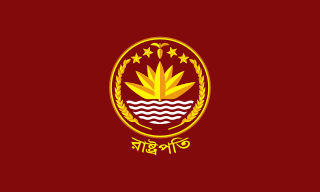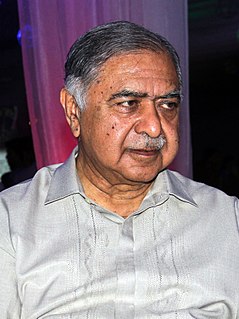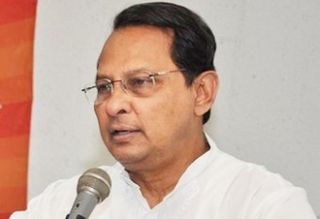
Politics of Bangladesh takes place in a framework of a parliamentary representative democratic republic, whereby the Prime Minister of Bangladesh is the head of government, and of a multi-party system. Executive power is exercised by the government. Legislative power is vested in both the government and parliament. The Constitution of Bangladesh was written in 1972 and has undergone sixteen amendments. The Economist Intelligence Unit has rated Bangladesh as "hybrid regime" in 2016.

Ziaur Rahman, Hilal e Jurat, Bir Uttom was the President of Bangladesh. He was an army general turned politician who, as a major in the army declared the Independence of Bangladesh on behalf of Sheikh Mujibur Rahman on 27 March 1971. He became President of Bangladesh on 21st April 1977. He was assassinated on 30 May 1981 in Chittagong in a army coup d'état.

The Bangladesh Nationalist Party is one of the two major contemporary political parties of Bangladesh. It was founded on 1 September 1978 by former Bangladesh President Ziaur Rahman after the Presidential election of 1978, with a view to uniting the people with nationalist ideology of the country. Since then, the BNP won the second, fifth, sixth and eighth national elections and two Presidential elections in 1978 and 1981. The party also holds the record of being the largest opposition in the history of parliamentary elections of the country, with 116 seats in the seventh national election of June 1996. It does not currently have representation in parliament after its boycotting of the 2014 national election.

Khaleda Zia is a Bangladeshi politician who served as the Prime Minister of Bangladesh from 1991 to 1996, and again from 2001 to 2006. She was the first woman in the country's history and second in the Muslim majority countries to head a democratic government as prime minister. She was the First Lady of Bangladesh during the presidency of her husband Ziaur Rahman. She is the current chairperson and leader of the Bangladesh Nationalist Party (BNP) which was founded by Rahman in the late 1970s.

The President of Bangladesh is the Head of State of Bangladesh.

Hussain Muhammad Ershad is a former Bangladeshi Army Chief and politician who served as the President of Bangladesh from 1983 to 1990, a time many consider to have been a military dictatorship.
Mohammad Mohammadullah was the President of the People's Republic of Bangladesh. Mohammadullah became the Acting President on 24 December 1973, was elected President on 24 January 1974, and took oath of office on 27 January 1974. He remained President until 25 January 1975.

Abdus Sattar was a Bangladeshi statesman. A leader of the Bangladesh Nationalist Party (BNP), he served as the President of Bangladesh from 1981 to 1982, and earlier as the Vice President of Bangladesh. A jurist by profession, Sattar held numerous constitutional and political offices in British Bengal, East Pakistan and Bangladesh. He was a cabinet minister, supreme court judge, and chief election commissioner.
Shah Azizur Rahman was a Bangladeshi politician who served as the Prime Minister of Bangladesh. However, he was the subject of considerable controversy for his collaboration with the Pakistan Army against the struggle to establish Bangladesh.

Kamal Hossain is a Bangladeshi lawyer and politician. He is head of Kamal Hossain & Associates, a law firm based in Dhaka, the capital of Bangladesh. Hossain is the founder and president of the Gano Forum political party and leader of the Jatiya Oikya Front alliance. He is widely regarded as an icon of secular democracy in South Asia. Hossain is the leader of the pro-democracy movement in Bangladesh.
Bangladesh has undergone several changes of government since its independence.
Lieutenant Colonel Syed Faruque Rahman was the 2IC of 1st Bengal Lancers Regiment of Bangladesh Army He was the chief organiser of the assassination of Sheikh Mujibur Rahman, the founding President of Bangladesh on 15 August 1975. Rahman led a group of junior army officers who overthrew Sheikh Mujib's regime and installed Khondaker Mushtaque Ahmed as president.
Ziaur Rahman, the president of Bangladesh, was assassinated by a faction of officers of Bangladesh Army, on 30 May 1981, in the south-eastern port city of Chittagong. Rahman went to Chittagong to arbitrate in a clash between the local leaders of his political party, the Bangladesh Nationalist Party. On the night of 30 May, a group of officers commandeered the Chittagong Circuit House, a government residence where Rahman was staying, shooting him and several others.

The Jatiya Samajtantrik Dal is a political party in Bangladesh.
1981 (MCMLXXXI) was a common year starting on Thursday of the Gregorian calendar, the 1981st year of the Common Era (CE) and Anno Domini (AD) designations, the 981st year of the 2nd millennium, the 81st year of the 20th century, and the 2nd year of the 1980s decade.
The history of Bangladesh after independence begins in 1971 with the independence of Bangladesh from Pakistan.
The 1982 Bangladeshi military coup d'état deposed the civilian government headed by the president of Bangladesh Abdus Sattar and brought to power the Chief of Army Staff of the Bangladesh Army Lt. Gen. Hussain Muhammad Ershad. After serving initially as the Chief Martial Law Administrator, Ershad assumed the post of president in 1983 and ruled until 1990.

Hasanul Haq Inu is a Bangladeshi politician and the former Minister of Information of Bangladesh. He leads a faction of the Jatiya Samajtantrik Dal and was involved in a Marxist insurgency in the 1970s.
Muhammad Yusuf Ali was a Bangladesh politician. He was the first minister for Education and Cultural Affairs in the first cabinet of Bangladesh.
The 7 November 1975 Bangladesh coup d'état was a coup d'état launched by left wing army personnel in collaboration with left-wing politicians from Jatiya Samajtantrik Dal. The coup killed Khaled Mosharraf who had removed those involved in the Assassination of Sheikh Mujibur Rahman from power. The coup also freed Ziaur Rahman from house arrest and allowed him to eventually seize power and become president.
















